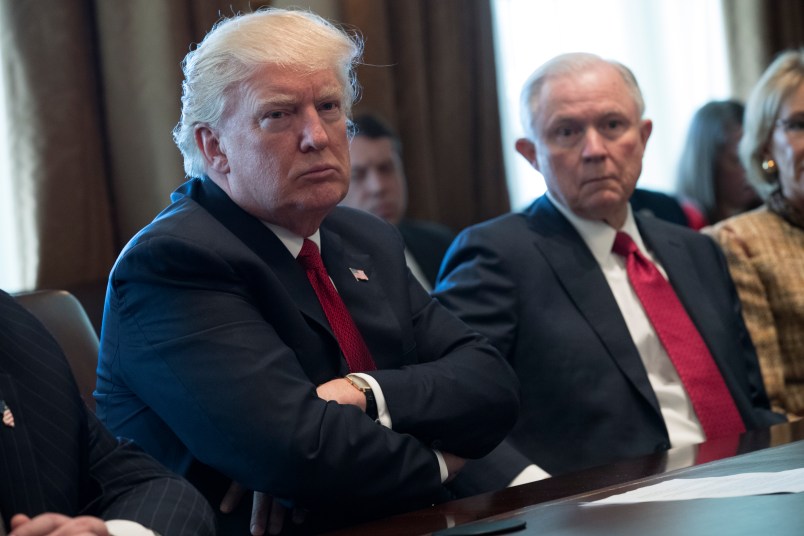The White House is going to war with the U.S. Justice Department over whether to release a sensitive classified memo that many Republicans say shines a light on improper conduct by the Justice Department, but which hasn’t been vetted by the intelligence community.
The Trump administration is backing the dozens of congressional Republicans who claim the memo, crafted by House Intelligence Committee Chairman Devin Nunes (R-CA), must be made public to ensure full transparency. But the Justice Department has said it would be “extraordinarily reckless” to surface a document based on classified information without the intelligence community’s sign-off. In response, the White House has said DoJ has no role in the process.
The open split would be remarkable in any context. That the Justice Department under Trump has often appeared willing to act in the president’s political interest only makes it more so.
President Trump dispatched his Chief of Staff John Kelly last week to personally inform Attorney General Jeff Sessions that the administration wanted the memo to be made public, according to the Washington Post. The two conversations that Kelly and Sessions had last Wednesday came the same day that a Trump appointee at the Justice Department released a letter chastising Nunes for rejecting FBI Director Christopher Wray’s “personal appeal” to review the document.
“We believe it would be extraordinarily reckless for the Committee to disclose such information publicly without giving the Department and the FBI the opportunity to review the memorandum and to advise [the House Intelligence Committee] of the risk of harm to national security and to ongoing investigations that would come from public release,” Assistant Attorney General Stephen Boyd wrote.
DOJ spokeswoman Sara Isgur Flores, another political appointee, added the next day in a rare cable news appearance that the department needed to see any alleged “evidence of wrongdoing” in order to “hold people responsible for it.”
Fox News reported that Wray was finally permitted to go to the Capitol on Sunday to review the document, and requested that his staffers be allowed “to take a look at it.”
White House legislative affairs director Marc Short characterized the intelligence community’s concerns as “rational,” acknowledging that he personally does not know what the memo contains, in an interview on “Fox News Sunday.” Still, he said, Trump “generally sides on the side of transparency” and wants the document released.
On Monday morning, White House spokesman Raj Shah said that the Oval Office would conduct a national security review of the document to determine if it could be released to the broader public, explicitly dismissing the DOJ’s role in vetting the document.
“The constitutional process as laid out involves the House of Representatives, the House Intelligence Committee and the White House and the President of the United States. The Department of Justice doesn’t have a role in this process,” Shah said on CNN.
The issue of the memo’s release is rapidly coming to a head. Republicans on the committee are expected to vote as early as Monday on the memo’s release, taking advantage of an obscure House rule that allows the intelligence committee to release classified information determined to be in the public interest.
The final decision to make the memo public would then rest with the President.
The memo reportedly shows that Deputy Attorney General Rod Rosenstein last March approved the extension of a surveillance order for Trump campaign adviser Carter Page. The memo reportedly criticizes department officials for failing to inform a Foreign Intelligence Surveillance Court judge that the warrant was based in part on the so-called “Trump-Russia dossier” compiled by a former British spy. Some Republicans call that proof of anti-Trump bias at the DOJ.
Democrats have dismissed the memo as a “conspiracy theory” that misrepresents the underlying evidence on which it is based. National security experts have also sounded off against the memo’s conclusions, saying the warrant’s 90-day extension would only be approved if enough new evidence had surfaced from Dec. 2016 to March 2017 to justify its renewal.
Nunes’ history of misinterpreting intelligence in order to defend the Trump White House from the Russia investigation and his refusal to allow Senate Intelligence Committee Chairman Richard Burr (R-NV) to view the document has fueled the assessment that it is being used for partisan purposes.







Still, he said, Trump “generally sides on the side of transparency” and wants the document released.
When is this farcical farce of a farce going to end?
They’re only in support of law enforcement when they are investigating the Democrats and Secretary Clinton.
Which side does Sessions support ?
Kellyanne: What IS “justice”, anyway?